Due to the booming of local and multinational companies, China has now become the world's largest market for vehicles and travel services. Between 2007 and 2017, the Chinese market grew at a rate of 16% per year, and its share of the global passenger vehicle market increased from 9% in 2007 to 30% in 2017. Let's take a look at the related content with the car electronics editor.
A recent study by McKinsey, a global management consulting firm, shows that China is likely to become the world's largest autopilot market in the future. By 2030, autopilot-related new car sales and travel services will generate more than $500 billion.
Beijing McKinsey Future Travel Research Center (MCFM) was also established recently. MCFM is a think tank and consultant for the travel industry. Based on McKinsey's extensive network of experts in the travel ecosystem, MCFM aims to provide a unique perspective on the future of the industry and innovative customer service. MCFM has four centers in Detroit, Munich, Silicon Valley and Beijing.
The report explains ten key insights shaping the development of China's autonomous driving market:
Insight 1: Automated driving technology, if realized, will bring huge economic and customer value.
Autopilot will increase your personal safety factor and reduce accidents by more than 90%.
Automated driving saves drivers an average of 50 minutes per day.
Autopilot can help people who don't drive (such as the disabled and the elderly) to travel autonomously.
Compared to renting or buying a car, the new mode of travel brought by autonomous driving can reduce the cost per kilometer.
Traffic jams and medical expenses have also been reduced due to fewer accidents.

Insight 2: If autopilot can take root in China, the prospects will be very broad.
By 2030, autonomous driving will account for approximately 13% of the total passenger mileage (PKMT) and will reach approximately 66% by 2040.
By 2030, the number of self-driving passenger cars will reach approximately 8 million; by 2040, it will reach approximately 13.5 million.
By 2030, total sales of self-driving cars will reach approximately $230 billion, and by 2040 will reach approximately $360 billion.
By 2030, the amount of travel-based service orders based on autonomous driving will reach approximately $260 billion, and by 2040 will reach approximately $940 billion.
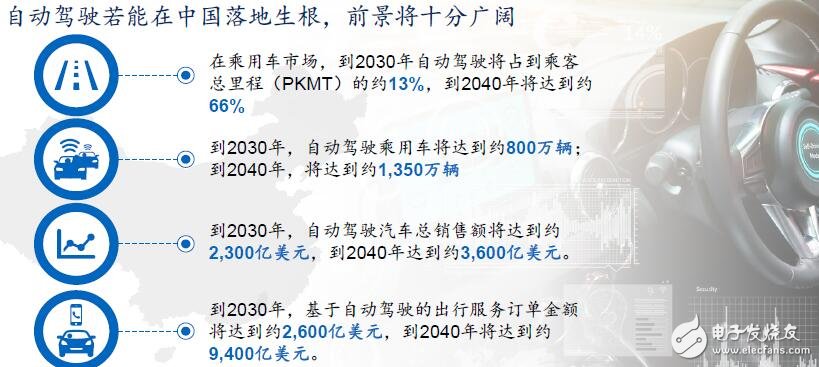
Insight 3: Car digitization is conducive to cost reduction, making large-scale promotion of autonomous driving easier to achieve.
McKinsey predicts that 2025-2027 will be the turning point for autonomous driving. Based on the estimation of the cost curve of the underlying technology of the automatic driving, this will be the economic parity point for autonomous driving and human driving. In other words, the total cost per kilometer of autonomous driving will be roughly the same as the cost of driving a traditional car. After this inflection point, the market demand for autonomous driving will steadily rise.
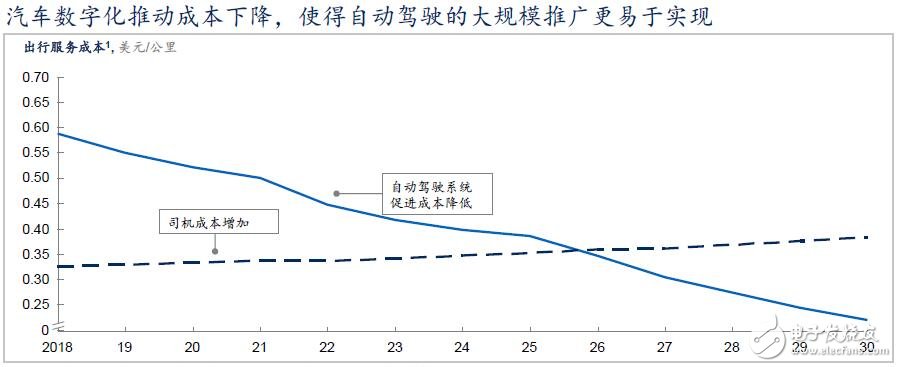
Insight 4: The promotion of autonomous driving will grow in tandem with travel services.
China is rapidly promoting travel services. Vehicles used for travel services currently account for about 10% of total Chinese car sales. Private cars still dominate. Currently, 90% of PKMT comes from private passenger vehicles, and the rest comes from other travel services such as taxis and vehicle sharing.
McKinsey predicts that by 2030, self-driving vehicles deployed by travel service providers will account for 11% of PKMT, and privately owned self-driving vehicles will account for 2%. By 2040, travel service providers will account for up to 55% of PKMT, and privately owned autopilots account for only 11%.
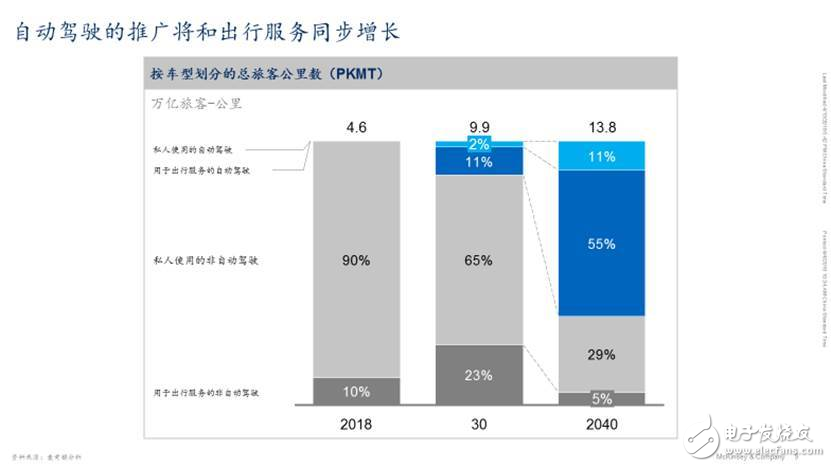
Insight 5: Chinese consumers have a strong interest in autonomous driving.
A recent McKinsey survey found that 49% of Chinese consumers believe that fully automated driving is “very important,†and another 49% of Chinese consumers consider it “nicent or not.†This result is in stark contrast to German and American consumers: only 16% of German and American consumers consider “automatic driving to be “very important†and 53% of German and American consumers consider it “nicent or notâ€.
Chinese consumers are willing to pay a premium of up to $4,600 for the purchase of self-driving vehicles, compared to $3,900 and $2,900 for the United States and Germany, respectively.
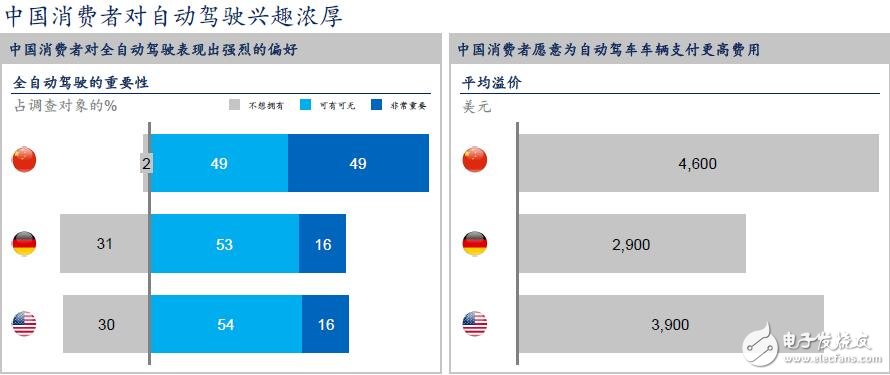
Insight 6: Achieving autonomous driving has a long way to go.
Automated driving systems are too costly and economically unattractive to be the biggest bottleneck affecting their development. McKinsey conducted research on experts in the field of travel on this topic. Only 27% of respondents believe that cost can be solved by 2025; another 37% think that it can be solved between 2025-2030; 20% think it will be at 2030- Resolved between 2034; 17% believe that it can be resolved after 2035.
Reliability and safety are another major bottleneck in promoting autonomous driving technology. Only 30% of respondents believe that this problem can be solved by 2025; 33% think it can be solved between 2025-2029; 36% think that it can be solved after 2030.

Insight 7: Industry game rules will change with the implementation of autonomous driving.
Up to now, the development of traditional auto parts and the design and brand of automobiles are the focus of automakers. But after the future of autonomous driving dominates, a whole new set of new technologies and new skills will be crucial. Based on our survey of travel industry experts, they believe that the three most important capabilities of the future autonomous driving value chain are autonomous driving software development, autonomous driving hardware production and automated driving system integration.
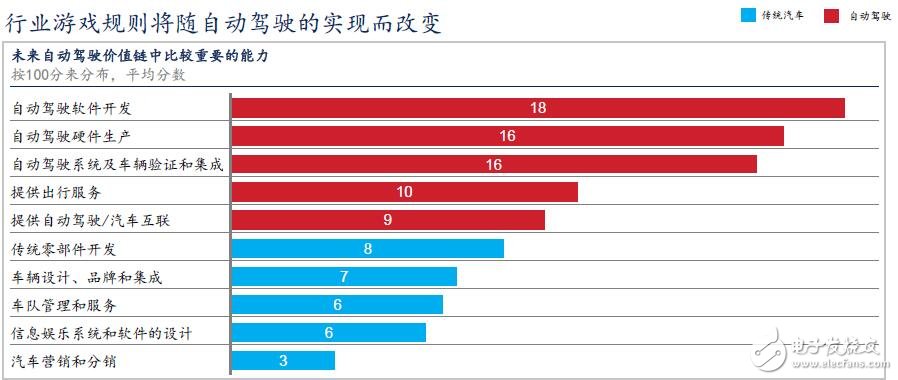
Insight 8: The business model will change with the implementation of autonomous driving.
The business-to-consumer (B2C) business model dominates the Chinese automotive market, with 89% of cars sold directly to consumers and only 11% sold to B2B fleet operators. Autopilot will change this situation. McKinsey predicts that by 2030, sales of traditional, non-autonomous vehicles for fleet operators will increase to 23%, and sales of self-driving vehicles for fleets will increase to 16%.

Insight 9: China's autonomous driving environment is more complex than the rest of the world... but usually requires the same technology.
Although it takes an additional 2-3 years to apply software algorithms to China's transportation environment, the underlying technology required to deploy autonomous driving in China is basically the same as in other countries around the world. Technologies including sensors, computing platforms, motion planning and control, and object analysis are likely to continue to be dominated by international technology giants. More data-related technologies, such as data clouds, maps and location services and connectivity, require comprehensive localization solutions or hybrid solutions that combine local and global technologies.

Insight 10: In China, a lot of capital, anticipation and publicity are emerging around autonomous driving (and many startups).
Currently, a large number of Chinese companies are embarking on the development of core components of the autonomous technology architecture, including laser radar, cameras, processors, software and map/location-based services. Between 2012 and 2017, approximately $7 billion of venture capital was invested in China's autonomous technology companies, which is equivalent to the amount invested in US start-ups during the same period. The average transaction size in China is $72 million, which is twice the size of the average US transaction.
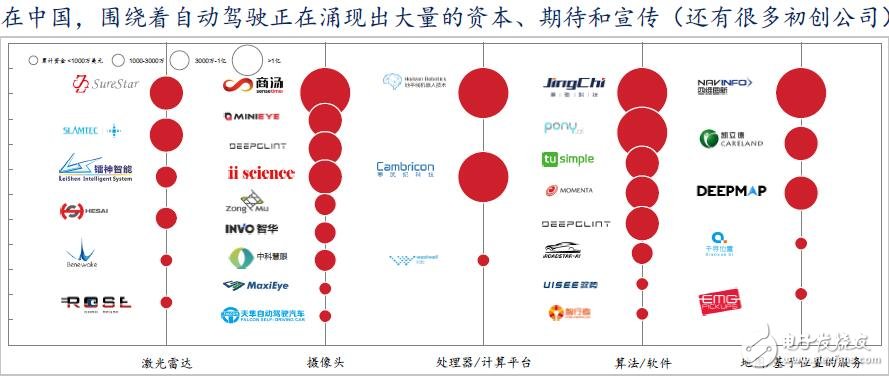
Wu, a global managing partner of McKinsey's Shanghai office and one of the authors of this report, said: “The current indicators show that autonomous driving has a unique advantage in China. Compared with consumers in other countries, Chinese consumers are considering Buying autonomous vehicles, especially in the high-end market. In fact, Chinese car buyers are particularly concerned about the performance of autonomous vehicles compared to consumers in other countries."
Christopher Thomas, global managing partner of McKinsey's Beijing office and one of the authors of this report, said: "Automotive manufacturers, high-tech companies and travel service providers in the Chinese market seem to think that autopilot is a decade or two. After that, postponing the positioning strategy may lose influence and freedom. The company should now take action on: determining the areas of participation; developing a roadmap to contact the technology architecture; deciding the appropriate alliance and ecosystem strategy; developing strategic agility , update its approach when new data appears on the market."
Wang Ping, a global managing partner of McKinsey's Shanghai office and one of the authors of the report, said: "We believe that in the process of developing autonomous driving, local companies and multinational companies will strike a balance. Despite the increasing competitiveness of local players. Enhanced, but multinational companies will continue to play an important role in the market, as consumers will still choose to buy cars produced by international vehicle manufacturers."
Brake Disc For LADA
Lada Brake Disc,Lada Auto Brake Disc,Lada Car Brake Disc,Lada Automobile Brake Disc
Zhoushan Shenying Filter Manufacture Co., Ltd. , https://www.renkenfilter.com